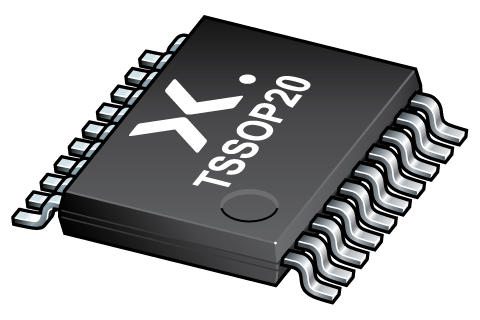Orderable parts
| Type number | Orderable part number | Ordering code (12NC) | Package | Buy from distributors |
|---|---|---|---|---|
| 74AHCT374PW | 74AHCT374PW,118 | 935262683118 | SOT360-1 | Order product |

Register once, drag and drop ECAD models into your CAD tool and speed up your design.
Click here for more informationOctal D-type flip-flop; positive edge-trigger; 3-state
The 74AHC374; 74AHCT374 is an octal positive-edge triggered D-type flip-flop with 3-state outputs. The device features a clock (CP) and output enable (OE) inputs. The flip-flops will store the state of their individual D-inputs that meet the set-up and hold time requirements on the LOW-to-HIGH clock (CP) transition. A HIGH on OE causes the outputs to assume a high-impedance OFF-state. Operation of the OE input does not affect the state of the flip-flops. Inputs are overvoltage tolerant. The 74AHCT374 device features TTL compatible inputs that are overvoltage tolerant. This feature allows the use of these devices as translators in mixed voltage environments.
Balanced propagation delays
All inputs have Schmitt-trigger actions
Wide supply voltage range from 2.0 V to 5.5 V
Overvoltage tolerant inputs to 5.5 V
High noise immunity
CMOS low power dissipation
Common 3-state output enable input
Input levels:
For 74AHC374: CMOS level
For 74AHCT374: TTL level
ESD protection:
HBM: ANSI/ESDA/JEDEC JS-001 class 2 exceeds 2000 V
CDM: ANSI/ESDA/JEDEC JS-002 class C3 exceeds 1000 V
Specified from -40 °C to +85 °C and from -40 °C to +125 °C
| Type number | VCC (V) | Logic switching levels | Output drive capability (mA) | tpd (ns) | fmax (MHz) | Power dissipation considerations | Tamb (°C) | Rth(j-a) (K/W) | Ψth(j-top) (K/W) | Rth(j-c) (K/W) | Package name |
|---|---|---|---|---|---|---|---|---|---|---|---|
| 74AHCT374PW | 4.5 - 5.5 | TTL | ± 8 | 4.3 | 140 | low | -40~125 | 100 | 4.5 | 44.5 | TSSOP20 |
| Model Name | Description |
|---|---|
|
|
| Type number | Orderable part number, (Ordering code (12NC)) | Status | Marking | Package | Package information | Reflow-/Wave soldering | Packing |
|---|---|---|---|---|---|---|---|
| 74AHCT374PW | 74AHCT374PW,118 (935262683118) |
Active | AHCT374 |

TSSOP20 (SOT360-1) |
SOT360-1 |
SSOP-TSSOP-VSO-WAVE
|
SOT360-1_118 |
| Type number | Orderable part number | Chemical content | RoHS | RHF-indicator |
|---|---|---|---|---|
| 74AHCT374PW | 74AHCT374PW,118 | 74AHCT374PW |
|
|
| File name | Title | Type | Date |
|---|---|---|---|
| 74AHC_AHCT374 | Octal D-type flip-flop; positive edge-trigger; 3-state | Data sheet | 2023-09-04 |
| AN11106 | Pin FMEA for AHC/AHCT family | Application note | 2019-01-09 |
| SOT360-1 | 3D model for products with SOT360-1 package | Design support | 2020-01-22 |
| ahct374 | ahct374 IBIS model | IBIS model | 2013-04-08 |
| Nexperia_package_poster | Nexperia package poster | Leaflet | 2020-05-15 |
| TSSOP20_SOT360-1_mk | plastic, thin shrink small outline package; 20 leads; 0.65 mm pitch; 6.5 mm x 4.4 mm x 1.1 mm body | Marcom graphics | 2017-01-28 |
| SOT360-1 | plastic, thin shrink small outline package; 20 leads; 0.65 mm pitch; 6.5 mm x 4.4 mm x 1.2 mm body | Package information | 2024-11-15 |
| SOT360-1_118 | TSSOP20; Reel pack for SMD, 13''; Q1/T1 product orientation | Packing information | 2023-08-30 |
| 74AHCT374PW_Nexperia_Product_Reliability | 74AHCT374PW Nexperia Product Reliability | Quality document | 2025-03-20 |
| SSOP-TSSOP-VSO-WAVE | Footprint for wave soldering | Wave soldering | 2009-10-08 |
If you are in need of design/technical support, let us know and fill in the answer form we'll get back to you shortly.
The Nexperia Longevity Program is aimed to provide our customers information from time to time about the expected time that our products can be ordered. The NLP is reviewed and updated regularly by our Executive Management Team. View our longevity program here.
| Model Name | Description |
|---|---|
|
|
| Type number | Orderable part number | Ordering code (12NC) | Status | Packing | Packing Quantity | Buy online |
|---|---|---|---|---|---|---|
| 74AHCT374PW | 74AHCT374PW,118 | 935262683118 | Active | SOT360-1_118 | 2,500 |
|
As a Nexperia customer you can order samples via our sales organization.
If you do not have a direct account with Nexperia our network of global and regional distributors is available and equipped to support you with Nexperia samples. Check out the list of official distributors.
The interactive datasheets are based on the Nexperia MOSFET precision electrothermal models. With our interactive datasheets you can simply specify your own conditions interactively. Start by changing the values of the conditions. You can do this by using the sliders in the condition fields. By dragging the sliders you will see how the MOSFET will perform at the new conditions set.